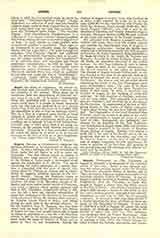

Angers, UNIVERSITY OF. —The University of Angers is, probably, a development of the cathedral school of that city. Early in the eleventh century this school became famous under the direction of Marbodus, afterwards Bishop of Rennes, and of Ulger, afterwards Bishop of Angers, both pupils of the renowned canonist, Fulbert de Chartres. It was enlarged in 1229 by an influx of students, many of them Englishmen, from the University of Paris, who sought in Angers a shelter from the direct control of the King of France. (See University of Paris.) Angers then became a center for the study of civil law, and a studium generale, although it was officially recognized as such only in 1337, by an episcopal ordinance. It received in 1364 from King Charles V a charter granting the same privileges as those enjoyed by the University of Orleans. It was only in 1432 that a Bull of Eugene IV added the usual faculties of theology, medicine, and arts to the faculty of canon and civil law. This organization continued until the French Revolution. After the National Assembly had granted to all freedom of teaching (July 1, 1875), the French bishops decided to found five Catholic universities, and Angers, thanks to Bishop Freppel, was chosen for the western portion of France, including the Dioceses of Angers, Rennes, Laval, Le Mans, Angouleme, Tours, and Poitiers. The university then took the title of “Facultes Catholiques de l’Ouest”. It comprises the faculties of letters, of sciences, and law, and a superior school of agriculture, with a teaching staff of 45 professors and from 200 to 300 students, most of whom are laymen belonging to the faculty of law. Angers has numbered among its faculty in the past Monsignor Sauve, author of numerous theological and philosophical works, Father Billot, now a professor in the Gregorian University at Rome, Father Antoine, author of a remarkable course of social economy, while it still retains Monsignor Legendre, an authority on biblical geography, and the distinguished novelist, Rene Basin. The University publishes the “Revue des Facultes Catholiques de l’Ouest” and a “Bulletin des Facultes Catholiques de l’Ouest”.
GEORGE M. SAUVAGE

